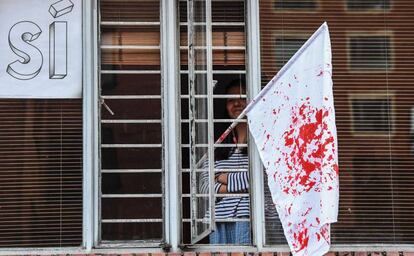Embattled Colombian government fights to save FARC peace deal
Plebiscite result highlights widespread dissatisfaction with country’s politicians


The aftershocks of the narrow victory for the ‘no’ camp in Colombia’s referendum on Sunday are still being felt.
The country now finds itself on the brink of a political crisis after voters rejected a peace deal hammered out by the government and the Revolutionary Armed Forces of Colombia (FARC) – a deal that promised to put an end to a 52-year civil war.
The government believed a win for the ‘yes’ vote in the plebiscite was a given, although it didn’t expect that victory to be crushing and there were concerns the minimum threshold of 4.5 million votes cast (13% of the electoral roll) might not be reached.
President Juan Manuel Santos says he will work towards peace “until his minute” in office
The opposition Democratic Center also had modest ambitions. Their hope was that a silent majority would at least hand them an honorable defeat.
But the narrowest of victories for the ‘no’ camp – it won by 54,000 votes of a total of nearly 13 million cast – has seen political figures of all stripes struggling to make sense of the new situation.
First and foremost, the peace deal brokered by the government of President Juan Manuel Santos needs an urgent rethink. Plenty of comparisons have been made between Brexit and the Colombian plebiscite in recent days, but there is one essential difference: in the Colombian conflict, there are weapons involved. And while Santos has assured Colombians the current ceasefire between the government and FARC will remain in place, the prevailing atmosphere of uncertainty must end as soon as possible.
Getting the necessary bodies around the table to find a way out of the current situation won’t, however, be easy.
The deep divisions between Santos and his predecesor Álvaro Uribe – leader of the ‘no’ campaign – have been all too clear since the current president began negotiating the peace deal four years ago. And while both politicians, along with FARC leader Rodrigo Londoño, alias ‘Timochenko,’ stressed the need for calm after Sunday’s vote, the way forward remains unclear.
The chief difference with the Brexit vote in the UK is that Colombia is awash with arms
In fact, Uribe rejected the offer of a place at the first meeting of the country’s political forces after the plebiscite, requesting instead an exclusive sit-down with government delegates. Some hours later, Santos confirmed a meeting between three spokespersons from Uribe’s Democratic Center party and government officials including chief peace negotiator Humberto de la Calle, Foreign Affairs Minister María Ángela Holguín, and Defense Minister Luis Carlos Villegas.
Meanwhile, a FARC disarmament process has stalled despite the fact that a United Nations mission charged with verifying that process is already on the ground. Given this state of affairs, Colombia will need to convey a message of calm to an international community that unanimously supported the peace process.
The economic situation is worrying too, with the Colombian peso falling against the US dollar in the wake of the loss for the ‘yes’ camp.
Colombia is also in need of political leadership of the first order – something that the current crop of politicians has proven incapable of thus far. Chief peace negotiator Humberto de la Calle is the exception. On Monday he offered his resignation, saying he took “full and exclusive” responsibility for the mistakes made. Santos subsequently rejected the official’s resignation.
Disarmament has stalled despite the UN mission charged with verifying the process already having arrived
Colombia’s abstention rate in elections has traditionally been high – it was 59.93% in the most recent presidential elections – but the turnout of just 37.43% on Sunday shows just how little faith the country’s voters have in their political class. Even after managing to forge a peace deal with the FARC that could end a five-decade long civil war, President Santos could only rally 18% of voters.
On the other side of the political divide, the Democratic Center – the country’s most popular party and the party of Uribe, it’s most popular leader – did little better.
On Sunday Santos assured voters he would continue to work toward peace “until the last minute” of his time in office, but recent polls show his popularity has taken a battering. He was re-elected on the back of his work on the FARC deal in 2014 and is difficult to see how he will recover from here.
There is a range of ways to understand the result and we have to see where errors can be corrected FARC chief Rodrigo ‘Timochenko’ Londoño
But for ex-President Uribe the picture is rosier. During the referendum campaign he successfully planted the seed of fear among Colombian voters, telling people the peace deal struck by the government would mean impunity for FARC rebels and plunge the country into a left-wing nightmare.
Colombia’s Constitution forbids Uribe for running for the country’s highest office again but his speech in the wake of victory for the ‘no’ side sounded like that of someone who has just won a presidential campaign. He spoke of the economy, of the upcoming tax reforms and of family values and education. Uribe also spoke of the need for unity although he would later reject an offer to sit at the table with FARC delegates during talks aimed at finding a way forward for the country.
FARC chief Rodrigo ‘Timochenko’ Londoño is also keeping his cards close to his chest. “There is a range of ways to understand [Sunday’s result] and we have to take a close look to see where errors can be corrected,” the FARC leader said from Havana, where the peace negotiation team are currently based.
Timochenko did not specify whether he thought the peace deal would now be renegotiated, and if so which points in particular were up for debate.
With the reputation of the guerrilla group in tatters in Colombia, the leftist rebels will now have to prove that a last-minute apology to its victims in the lead-up to Sunday’s vote was sincere and not mere political opportunism.
English version by George Mills.
Tu suscripción se está usando en otro dispositivo
¿Quieres añadir otro usuario a tu suscripción?
Si continúas leyendo en este dispositivo, no se podrá leer en el otro.
FlechaTu suscripción se está usando en otro dispositivo y solo puedes acceder a EL PAÍS desde un dispositivo a la vez.
Si quieres compartir tu cuenta, cambia tu suscripción a la modalidad Premium, así podrás añadir otro usuario. Cada uno accederá con su propia cuenta de email, lo que os permitirá personalizar vuestra experiencia en EL PAÍS.
¿Tienes una suscripción de empresa? Accede aquí para contratar más cuentas.
En el caso de no saber quién está usando tu cuenta, te recomendamos cambiar tu contraseña aquí.
Si decides continuar compartiendo tu cuenta, este mensaje se mostrará en tu dispositivo y en el de la otra persona que está usando tu cuenta de forma indefinida, afectando a tu experiencia de lectura. Puedes consultar aquí los términos y condiciones de la suscripción digital.








































